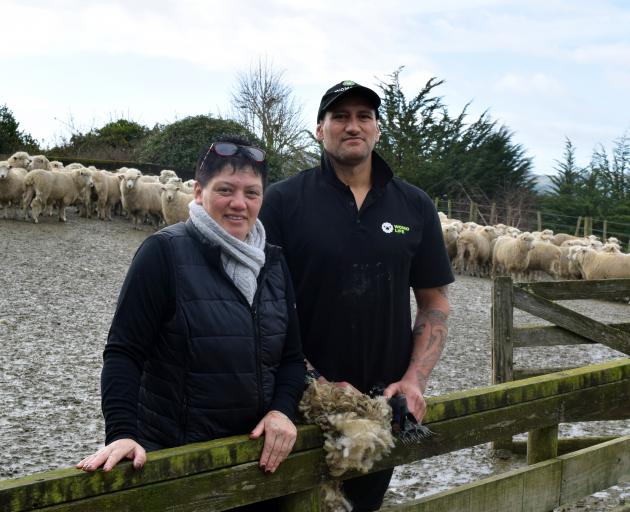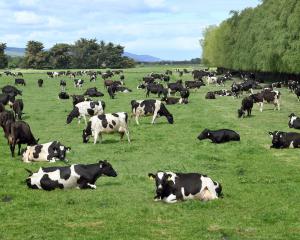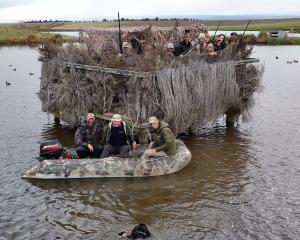
Southern wool harvesting mentors are calling for the government to resume funding for training of wool harvesting to attract more young people to the sector.
Womolife trainers Stacey Te Huia, of Alexandra, and Tina Elers, of Mataura, taught eight shepherds skills including crutching and wool handling, at Jeff Farm in Kaiwera, about 20km southeast of Gore, for three days last week.
When Southern Rural Life visited, the shepherds were dismantling their hand-pieces to clean and oil them.
The government awarded a $1.864 million contract for a pilot programme to grow and upskill New Zealand’s wool industry.
Womolife delivered the programme in two areas, Otago and Southland, as well as Hawke’s Bay and Gisborne, from 2021.
Wool harvesting was on the government’s list of essential services during the Covid lockdown.
Miss Elers said the pilot programme exceeded expectations.
However, the government funding had been exhausted and there was no longer any subsidy available for Womolife training.
She had concerns the cost could deter some young people entering the industry and create staff shortages.
"You don’t want a lull in the industry where there’s no training and young ones coming through."
Wool harvesters had been given pay rises about a year ago in a bid to discourage them from travelling to Australia to earn more for the same work.
"We lose a lot to Australia."
The pay increase had helped retain workers in New Zealand, she said.
A focus of her family business, Bill Elers Contract Shearing, was creating a working environment staff wanted to remain part of.
Mr Te Huia wanted the government to continue funding of Womolife.
The shepherds had to miss three days of work and pay hundreds of dollars to attend the programme.
"That’s a lot of money. If the government can subsidise it then you’ll get a lot more people coming on these courses, which will help the industry."
There was a shortage of woolhandlers in the South, he said.
"I work in Ranfurly and we have six to seven crews running most days and there’s not enough woolhandlers."
Many wool handlers left the industry to focus on raising a family.
Amplifying the woolhandler shortage was a lack of childcare facilities and the lure of better pay in Australia, he said.
In Australia, farmers paid a wool levy and some of it was used to pay to train wool harvesters.
He doubted farmers would want a levy to be revived in New Zealand because of low wool prices.

"So who’s going to jump in here when it is 35°C and you’re working your a... off?"
Fewer people were willing to work hard for a living, he said.
He shared a sentiment expressed by experienced Australian rugby league coach Wayne Bennett, who believed it was left to the coaches to make players work hard, as it was no longer installed in them growing up.
He worked on coaching the mindset of those in his Womolife programme, Mr Te Huia said.
"You don’t have to be strict with a whip but you can teach them how to use their mind more than their physicality."
He taught them how to remain focused on a goal, rather than "10,000 things on TikTok".
Shearers usually got out of bed at at 5am and finished work at 5pm, but the most important time for becoming a better shearer was the 12 hours from 5pm, he said.
"Once I knock off at 5pm, I eat healthy, go to the gym, spend time with my family and get a good night’s sleep, so when I wake at 5am, I’m ready for work."
The course content included managing money, goal setting and aspiring to be better, he said.
"It’s the whole picture, not just on the boards, because your personal life will affect your work life."
A Ministry of Business, Innovation & Employment spokeswoman said funding for the pilot schemes in Otago, Southland, Gisborne and Hawke’s Bay delivered the outcome of 311 people going through the programme across the regions, of which 164 were existing employees who had been upskilled.
Of the 147 new entrants into the industry, 70% identified as Māori.
The funding also enabled the delivery of additional training courses, on top of what had been contracted.
"This resulted in a further 158 participants going through the programme."
Nearly 470 participants had completed the training programme, she said.
"While there was no further funding through the Te Ara Mahi allocation of the Provincial Growth Fund, we are not able to comment on the wider government. This project is now completed, but the recipient continues to engage with stakeholders within the wool sector."














